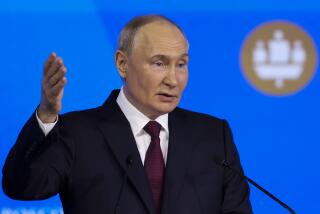Clinton Warns India on Perils of Nuclear Armament
- Share via
NEW DELHI — President Clinton on Wednesday hailed India as a beacon for democracy and diversity, but he also told the nuclear-capable nation that weapons of mass destruction do not guarantee national security.
“A nuclear future is not a more secure future,” Clinton said in an address before the Indian Parliament--his latest bid to lessen the tensions between India and Pakistan, longtime rivals that captured the world’s attention in 1998 by conducting tit-for-tat nuclear tests.
Clinton acknowledged that the United States has possessed nuclear arms for more than half a century but noted that, since 1988, Washington has dismantled more than 13,000 such weapons. He pointed out that the U.S. has helped Russia dismantle some of its nuclear arsenal as well.
“Most of the world,” Clinton said, “is moving toward the elimination of nuclear weapons.”
Clinton recalled that the former Soviet Union and the U.S. “came far too close to nuclear war” despite years of direct contact with each other, evidently referring to the 1962 Cuban missile crisis.
“We learned that deterrence alone cannot be relied on to prevent an accident or miscalculation,” Clinton said as members of Parliament and their guests listened politely. “And in a nuclear standoff, there is nothing more dangerous than believing there is no danger.”
Since exploding its underground atomic devices two years ago, India has been moving to deploy a force of nuclear weapons to serve as a “minimum credible deterrent,” but it has not said how many weapons that would entail.
The potential for an Indo-Pakistani war, possibly involving nuclear weapons, has emerged in recent days as a bone of contention between Clinton and India’s leaders.
Twice in recent months, Clinton has called South Asia “the most dangerous place in the world.”
But Indian Prime Minister Atal Behari Vajpayee and President Kocheril Raman Narayanan this week disputed that characterization.
Clinton addressed Parliament in its Central Hall, a vast, domed chamber lined with larger-than-life portraits of many of India’s freedom fighters and former prime ministers.
The audience provided a kaleidoscopic reflection of the diversity of a nation with 1 billion people and no fewer than 17 official languages. Amid the dark suits were riotous bursts of colorful saris and turbans as well as other native wear. One member draped a colorful scarf around Clinton’s neck as the president was leaving the chamber.
On the second day of his five-day visit to India, Clinton spoke candidly but gently about policy differences that bedevil India and the U.S., especially over the development of nuclear arms.
“Only India can determine its own interests. Only India can know if it truly is safer today than before the tests,” the president said, as the audience burst into applause. “These are questions others may ask, but only you can answer.”
Clinton urged New Delhi to engage in a dialogue with Pakistan and suggested anew that India consider a third party to help in such talks. He noted that his discussions with then-Pakistani Prime Minister Nawaz Sharif last summer prompted Pakistan to pull back its forces near the Indian town of Kargil in the contested region of Kashmir.
But India has shown no interest in outside help on the matter.
After Clinton’s speech, legislators mobbed him as he left the chamber, shaking hands as he inched up the middle aisle. Near the exit, the crush of well-wishers caused Clinton to stumble slightly. But Secret Service agents quickly surrounded the president and ushered him out.
Also Wednesday, Clinton met with Sonia Gandhi, the widow of slain former Prime Minister Rajiv Gandhi and now leader of the opposition Congress Party. After two days of diplomacy, Clinton later left the Indian capital to do some sightseeing.
The first stop for the president and his daughter, Chelsea, was a tour of the Taj Mahal in Agra. Using the Taj Mahal as a backdrop, Clinton announced several initiatives to help India develop cleaner energy resources, including one that provides $45 million in funds from the U.S. Agency for International Development.
Clinton was scheduled to spend most of today too playing tourist, including a visit to Ranthambhore National Park, a tiger reserve. On Saturday, he is to fly to Islamabad, the Pakistani capital, to meet with Gen. Pervez Musharraf, who ousted the democratically elected Sharif in a coup in October.
Clinton told the Indian Parliament that he intends to deliver the same message on nuclear nonproliferation to Musharraf.
*
Times staff writer Dexter Filkins contributed to this report.
More to Read
Sign up for Essential California
The most important California stories and recommendations in your inbox every morning.
You may occasionally receive promotional content from the Los Angeles Times.













